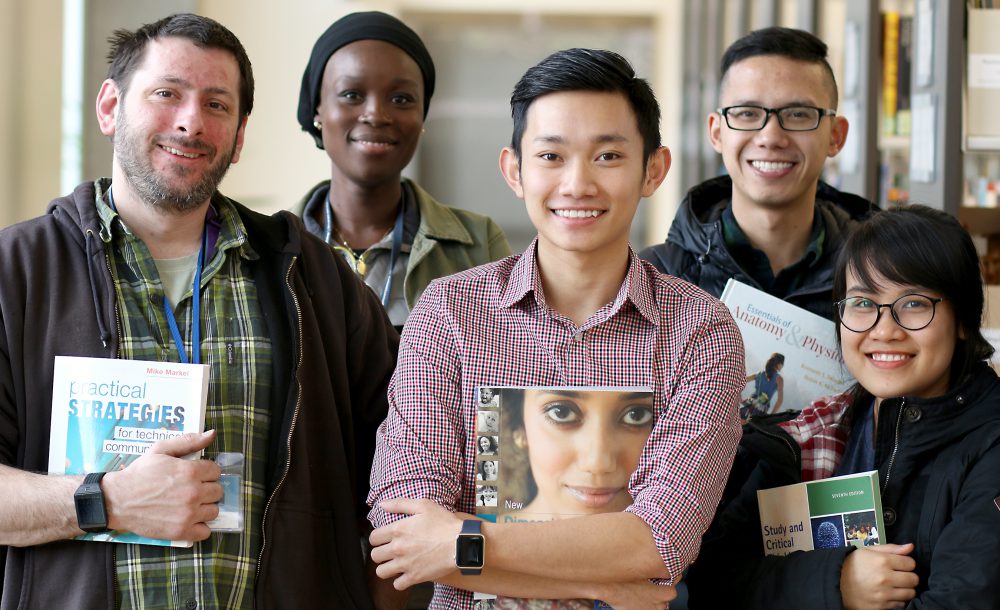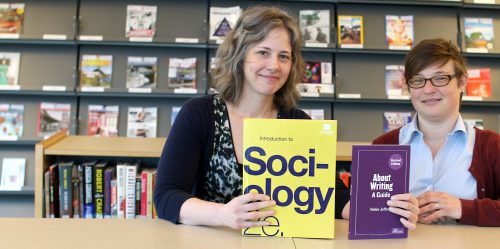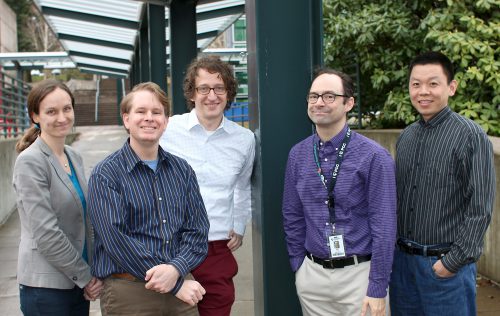This content was published: April 10, 2017. Phone numbers, email addresses, and other information may have changed.
Faculty tackle problem of skyrocketing cost of textbooks with effective OER project
Photos and Story by James Hill

Students say the rising costs of textbooks has impacted their pocket books. Left to right are San Jesperson, Nadia Halirou, Kien Truong, Tai Pham and Hieu Tran.
Portland Community College’s Open Educational Resources (OER) movement has paid off for students.
Literally.
In response to the skyrocketing cost of textbooks, PCC staff, faculty and students came together to establish a program that reduces the cost of books for an array of class sequences. The college’s effort to emphasize no-cost and low-cost textbooks has saved students more than $1 million since starting its OER project in 2015, and faculty organizers are targeting $3 million more in savings during the next two years as the project grows.
Some faculty are now able to adopt a complete open textbook to replace their commercial book. To make it easier on students, PCC’s course catalog indicates what courses have no-cost and low-cost texts available. Areas where OER has taken hold at PCC include classes in Math, English, English for Speakers of Other Languages, Management and Supervision, Writing, Psychology and Geology.
“My biggest fear at the beginning of every term is when I’m buying textbooks,” said 20-year-old Kien Truong, a student leader studying international relations at the Southeast Campus. “As a full time student, I normally take 3-4 classes every term which means I have to spend more than $300. It is like the cost of taking another class. I end up skipping my breakfast or lunch many times because I can’t afford it. I normally try to take the class that does not require the textbooks; or if it does, I then go and borrow or buy used books from my friends.”
Rising Costs a Burden
At PCC, most credit classes require a textbook, and the majority of them cost more than $100. In the past three decades, the cost of textbooks has risen by 812 percent, outpacing the rise in costs associated with inflation, health care, housing, and college tuition and fees. These rising textbook costs, like having to pay $280 for one biology book, have become a burden on students. Many are forced to use their housing and food budgets to pay for the required textbooks for their classes.

Founders of PCC’s OER movement are college faculty reference librarians Jen Klaudinyi (right) and Rachel Bridgewater.
In response to these surging costs, college faculty reference librarians Jen Klaudinyi and Rachel Bridgewater formed a steering committee. It is made up of stakeholders from across the district, including the Library, Bookstore, Distance Learning, Disability Services, student government and faculty. Soon after its formation, the group got key administrative support from Rock Creek Campus President Sandra Fowler-Hill, which has helped create buy-in at PCC.
“Faculty from across the college have adopted open and alternative course materials to make these student savings possible,” Klaudinyi said. “Even when open texts are available for courses, it takes hard work to redesign classes, so it is the faculty who deserve congratulations for achieving these savings.”OER Movement Gaining Steam
This week, the college is celebrating the OER movement from April 10-14. OER involves open textbooks, which are texts released under flexible copyright licenses, like Creative Commons, that facilitate copying, printing and adapting at no cost. They are often written by scholars and published by grant-funded projects or universities.
Other PCC instructors can adapt existing open materials, adopt the pieces that work, and incorporate other free or low-cost materials like library eBooks or articles. Some instructors even create their own materials, like brand new, complete textbooks. Several college faculty teams have received outside funding to adopt, adapt or create open materials for their courses from Open Oregon Educational Resources – a legislative initiative dedicated to making textbooks affordable in the state.
Instructors have been using open and alternative resources long before it became an initiative at the college. But since Oregon passed legislation in 2015 making it easier for colleges to adopt OER practices, the momentum is surging across the state as well as in Washington and California, which have state-level OER funding and legislation.
“Without external funding from the state, especially grants from Open Oregon, we would not have been able to achieve these savings for students,” Klaudinyi added. “At the heart of this work, faculty are able to reconnect with their learning objectives and incorporate relevant materials that help students learn.”
Savings Example: The Math Sequence
One of the proposed textbook adoptions under way is where the PCC Board of Directors made a Strategic Planning Initiative investment of $190,000 that could translate in another $1 million in annual savings in the near future. The project focuses on math courses, which are some of the highest enrolled at the college: Math 60 and 65 attract 6,000 and 3,000 credit students, respectively, every year. The classes use the same commercial textbook, which runs about $117 new at the PCC Bookstore.

The Board of Directors made it a priority to fund math faculty’s project to save students another $1 million in annual textbook savings.
The next class, Math 95, uses a different textbook, which also costs $117 for the estimated 4,000 students who enroll in it annually.
“It’s a shame that so much money is spent on these textbooks for basic algebra when knowledge in these topics has not changed in hundreds of years,” said Alex Jordan, math instructor and project lead.
Jordan said his Open Resources for Community College Algebra Project aims to create a single set of course materials that covers the algebra series and uses attractive features found in commercial textbooks, such as online homework, interactive reading, and embedded videos. The final product will be freely available to students as an eBook, with print versions sold in the bookstore for reasonable prices.
“PCC will own the copyright to the book, but it will be openly licensed with a Creative Commons Attribution license, meaning that other schools have permission to use or modify and use the book as they like,” Jordan said.
In Fall 2017, some sections of math will pilot phases of the new project and by spring term of 2018, all materials will be piloted in some sections across PCC with wider adoptions to follow.
What the Students Say
“The high cost of textbook impacts me financially. When I first came to the USA, I spent around $200 every term on textbooks on top of my out-of-state tuition. It was crazy, but I had no other options. I always used the option of buying used books. I try my best not to buy textbooks by borrowing books from the library to study for my exams, or to do homework. I also have lent books from my peers. The most astonishing part is that I have rarely used my textbooks in most of my classes. I prefer using online slides which the instructors share rather than read from a giant textbook.” – Nista Shrestha, 21, International Studies.
“The high costs of textbooks impact me drastically. With the money used for these high cost textbooks, we could have used it to pay rent, phone bills, electricity, food, clothes, blankets and other housing needs. Many college students are suffering from food/housing insecurity, and these high-cost textbooks are not alleviating the burden. I get around the cost of textbooks by sharing with another, asking the instructor if I can use a previous edition despite what they assigned, checking it out from the library, scanning the pages from the textbook and copying it, purchasing it used, or borrowing from a friend.” – Ryo An, 22, Business.


This is good work, and I congratulate all involved in the success the program has made so far. An exciting part about OER is that it also offers the opportunity to break the pattern of one textbook for the entire course. If materials are free or cheap, then instructors can pull together instruction sessions from a variety of sources, books, newspapers, websites, magazines, whatever is best suited for teaching that particular lesson.
I agree, I am now taking one class because I can not afford to pay for the books. I think this is great idea to make possible availability for every one.
This is so great. I have bought two textbooks for basic CIS courses, one in fall and one in winter term, that book buyback would not buy back at the end. Another way to save students money would be to 1) offer the used alternative if possible (at Rock Creek they just go get the books for you and you can’t see if a used one is available); 2) warn them if they are not going to be able to sell the book back at the end of the term (because it’s being replaced the following term); and 3) buy back more of the books. I am not sure why the Computer Concepts 2 book was rejected by book buyback and they can never tell us. If it’s in good shape and the class is still using it they should buy it back. I was unable to buy a used one for winter term and since it’s a book especially made for PCC I can’t really sell it on the open market. This is frustrating.
This is so wonderful. Many thanks to my colleagues in the math department who are working on the Calculus book…it’s long overdue and will make a huge impact for students. I also noticed that Portland State is doing something like this when in their library. Wouldn’t that be a great partnership?